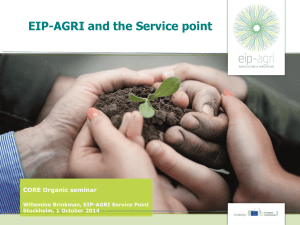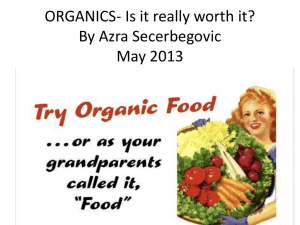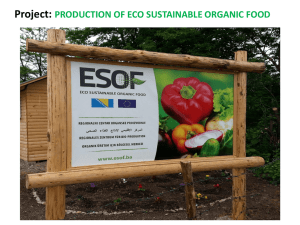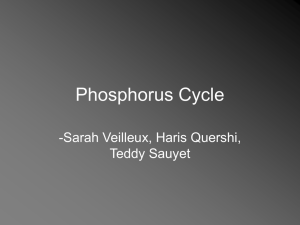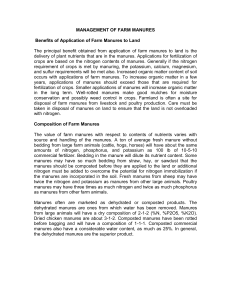Phosphorus in manures and other organic products
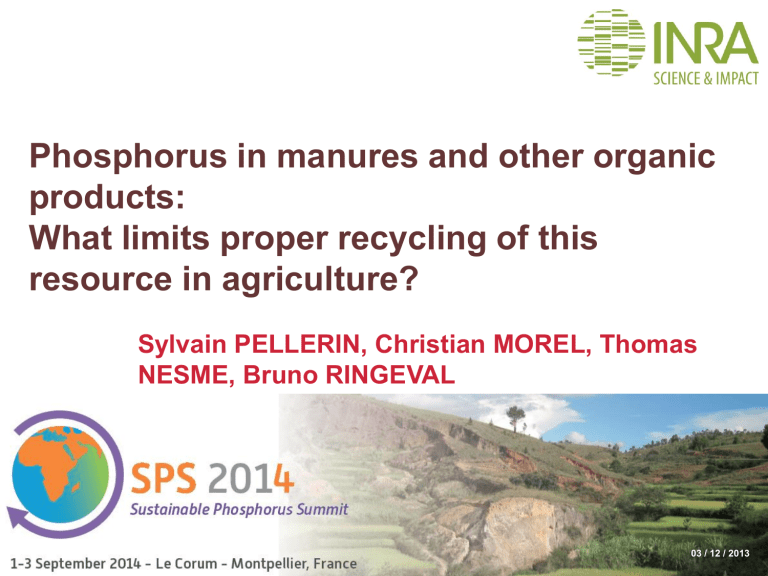
Phosphorus in manures and other organic products:
What limits proper recycling of this resource in agriculture?
Sylvain PELLERIN, Christian MOREL, Thomas
NESME, Bruno RINGEVAL
NOM DE L ’AUTEUR 03 / 12 / 2013
Outline
Background
Four barriers / issues for optimal recycling of P from manures
Geographical segregation between livestock and crop production systems
Inadequate N/P ratio
Mismatch with temporal crop requirements
Uncertainties in P fertilizing value assessment
Conclusion
Phosphorus in manures and other organic products
02 Sept 2014
P in organic products
• 4 - 40 mg P per kg dry matter
• Swine slurry > Urban sewage sludge > Beef/Cattle manure >
Urban composts
• High variability (due to variability of animal diets, manure processes,…)
• Inorganic P
55-95% of total P
70
60
50
40
30
20
10
0
*
P content (mgP/kg dry matter)
*
*
*
3 manure (32)
4 composts (23)
Morel et al., unpublished
Phosphorus in manures and other organic products
02 Sept 2014
Organic fertilisers are as effective as mineral fertilisers for mid-term soil P fertility build-up
Poultry litter
Triple superphosphate (TSP)
Poultry litter + TSP
P balance (kg P ha -1 )
Shepherd and Withers, 1999
Phosphorus in manures and other organic products
02 Sept 2014
At the global scale, the amount of P in manures represents 17 Tg P.y
-1
(more than P in mineral fertilizers)
But P budget calculations suggest a non-optimal use of this resource
⇒ Assuming an « optimal » manure
P recycling, the need for additional mineral P would be much lower than actually observed (2 instead of 14 Tg P y -1 )
P manure
P fertilizers
Total P input
P withdrawal
P, Tg.y
-1
(year 2000)
17
14
31
19
Bouwman et al., PNAS, 2011
Phosphorus in manures and other organic products
02 Sept 2014
Only partial substitution of mineral P by
P from organic products is also observed at local scale
Ex of France: 76 agricultural districts, approx. 5000 km 2
Phosphorus in manures and other organic products
1:1 line
⇒
Full substitution hypothesis
Nesme et al., 2014
02 Sept 2014
What limits proper recycling of this P resource?
Phosphorus in manures and other organic products
02 Sept 2014
1. Farm specialisation and increasing geographical segregation between livestock and crop production systems
• hamper the use of manure as a P fertilizer source in specialised arable farming regions
• are responsible for excess P in animal farming regions
Livestock density (LU ha -1 ) P manure (kg P ha -1 ) P mineral fertilisers (kg P ha -1 )
Phosphorus in manures and other organic products
Source: Eurostat
02 Sept 2014
P budgets for two contrasted French agricultural regions
Brittany
Centre
Phosphorus in manures and other organic products
02 Sept 2014
Intensive animal farming region (Brittany)
► The soil P budget is highly positive (+ 18.9 kg P ha -1 yr -1 )
► High P inflows due to feed imports (28.9 kg P ha -1 yr -1 ) and fertiliser use (7.9 kg P ha -1 yr -1 )
► Even without P fertiliser use, the soil P budget would remain positive
Phosphorus in manures and other organic products
Senthilkumar et al., 2012
02 Sept 2014
Intensive arable farming region (Centre)
► The soil P budget is close to the equilibrium (+1.1 kg P ha -1 yr -1 )
► However, crop exports are supported by massive mineral P fertiliser imports
(+12.9 kg P ha -1 yr -1 )
Phosphorus in manures and other organic products
Senthilkumar et al., 2012
02 Sept 2014
2. Organic fertilising materials have low N/P ratio. If used for N targeted fertilisation they lead to soil P excess
⇒ this P accumulates in soils
⇒ and is no longer available as a substitute for mineral P elsewhere
N/P ratio
15
N/P ratio of organic products Leaf N/P ratio
(TRY global database,
Kattge et al., 2011)
10
5
0
*
N/P ratio of harvested organs (15 arable and forage crops)
Poultry manure
2
Beef/cattle
3
Phosphorus in manures and other organic products
Morel et al., unpublished
.03
02 Sept 2014
Example of a N-P budget for wheat fertilised with cattle manure
Target yield
Mg dry matter ha -1
8
N content in grain mg g -1 dry matter
P content in grain mg g -1 dry matter
20 3
N exports kg N ha -1
P exports kg P ha -1
Amount of cattle manure required to compens ate N exports kg DM ha -1
Amount of P supplied kg P ha -1
160 24 6400 44.8
0
N budget kg N ha -1
P budget kg P ha -1
+20.8
Phosphorus in manures and other organic products
.03
02 Sept 2014
3. Questions remain about the ability of P from organic fertilizers to match crop requirements in time
Ex of the early « critical stage » on maize
Mineral P « starter fertilisers » are often used by farmers to supply high P concentrations close to the roots during this critical stage
This questions the ability of organic products to act as an effective substitute to soluble mineral fertilisers in this context
Moreover, scheduling applications of organic fertilisers is often constrained by practical aspects (trafficability, etc…)
Phosphorus in manures and other organic products
Mollier, 2013
.03
02 Sept 2014
4. Methodological issues and uncertainties in P fertilizing value assessment
0 P + P
OF
+ P
MF
Classical approach:
Standardized plant P tests
No P added
(control)
Organic fertilizer
(OF)
Same amount of P added as soluble mineral fertilizer (MF)
Relative Efficiency (in %)
P uptake
OF
P uptake control
P uptake
MF
P uptake control
100
This approach may be misleading because it assumes that the amount of P taken up by plants originating from the soil is not modified by experimental treatments (P uptake control)
⇒ Standardized plant test using labelling techniques
( 32 P or 33 P) are more reliable, but require dedicated laboratory facilities.
Phosphorus in manures and other organic products
.03
02 Sept 2014
Farmyard manure
Poultry manure
Fertilising value (% soluble mineral fertiliser)
Labelling No labelling
68
43
207
407
Soluble mineral fertiliser
100 100
Mohanty et al., 2006
Phosphorus in manures and other organic products
.03
02 Sept 2014
Reliable studies show that the short term P fertilising value of animal manures is generally high
Organic sources
Pig manure
Beef manure
Poultry manure
Relative efficiency (% of soluble mineral fertiliser)
Range
84-102%
68-111%
43-88%
But it remains that the short-term dynamics of P after manure application may be affected by many factors (e.g. P immobilisation by microbial biomass if high C/P ratio)
⇒
Standardized plant tests are useful tools to rank organic products in standardized conditions
⇒ We need a better understanding of the short term fate of P after manure application in field conditions
Phosphorus in manures and other organic products
.03
02 Sept 2014
Summary and Conclusion
• Organic fertilisers are as effective as mineral fertilisers for midterm soil P fertility build-up.
• Reliable results suggest that short term P availability in manures is generally high, although variable
• Optimal substitution of mineral P by P from organic products is limited by
– the increasing geographical segregation of animal and crop farming regions,
– inadequate N/P ratio,
– Questions about the ability of P from organic fertilizers to match crop requirements in time
– Uncertainties in P fertilizing value assessment
• Practical constraints (storage, handling, trafficability) may also act as barrier
.03
02 Sept 2014
Phosphorus in manures and other organic products
Summary and Conclusion
• Innovations are needed
– To reconnect livestock and crop production
• Regulation on maximum livestock densities?
• Exchange markets of manures
• Technologies to reduce volumes and transportation expenses (granular, pellets,…)
• Recovery options (struvite precipitation,…)
– to get a N:P ratio better adapted to plant requirements
• Reduce P content in manure by re-aligning P diets on animal requirements,…
• Increase N content by reducing N gaseous losses
• A research effort is still needed to better understand and predict short term P release and availability for plants after application
.03
02 Sept 2014
Phosphorus in manures and other organic products
Thank you for your attention
Phosphorus in manures and other organic products
.03
02 Sept 2014
Today, the lack of robust references about short term P fertilising value of organic products may partly explain why farmers do not fully take into account manure application as mineral dose diminishing factors
1:1 line
⇒
Full substitution hypothesis
Phosphorus in manures and other organic products
.03
02 Sept 2014
More reliable approaches are based on labelling techniques
(3) Determination of the 31 P and 32 P quantities in aerial parts
(4) Calculation of the fraction of the P taken up by plants which derives from the fertilizer (Pdff, in %)
Relative Efficiency (in %)
Pdff
OF
100
Pdff
MF
Control
(0P)
(2) 50 mg P kg -1 soil applied as:
Organic fertiliser (OF)
or Triplesuperphosphate (MF)
(1) Isotopic labelling of plant-available soil P with 32 P-PO
4 or 33 PO
4
Phosphorus in manures and other organic products
.03
02 Sept 2014





